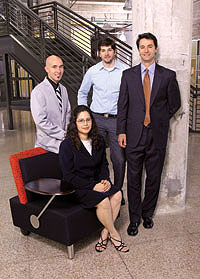Students Put Businesses Under the Microscope
By Tim W. Jackson
 Tom DeCarlo (right) helps business students learn from the pros at Birmingham’s Innovation Depot. When Thomas DeCarlo, Ph.D., came to the UAB School of Business from Iowa State University, he brought with him a simple idea: After professors finish lecturing about the challenges of modern business in the classroom, why not send students out to experience those challenges firsthand?
Tom DeCarlo (right) helps business students learn from the pros at Birmingham’s Innovation Depot. When Thomas DeCarlo, Ph.D., came to the UAB School of Business from Iowa State University, he brought with him a simple idea: After professors finish lecturing about the challenges of modern business in the classroom, why not send students out to experience those challenges firsthand?
Once he arrived in Birmingham, DeCarlo, a marketing expert who holds the Ben S. Weil Endowed Chair of Industrial Distribution at UAB, found the perfect spot for his student start-up at Innovation Depot, the city’s new high-tech business incubator. Located between the university and the corporate offices of downtown Birmingham, the depot is now the headquarters for the fledgling Business Analysis Laboratory, which acts as a student-run consulting firm. In the course of a typical semester, teams made up of six students and one faculty member tackle product, distribution, process engineering, and customer-based problems for local companies such as OSRAM Sylvania, O’Neal Steel, and Alabama Power.
The students benefit from learning how to put classroom training into practice and how to demonstrate their skills for potential future employers. Businesses get to tap an eager labor pool. And faculty in UAB’s business school contribute both oversight and insights into the latest academic theories and their applications to each project.
Learning from Experience
The location of the lab among the young start-ups at Innovation Depot is also strategic, says DeCarlo. “It’s a natural fit for us to be down there. Students get to see how entrepreneurial companies work and how they struggle to succeed.”
Not all of the lab’s clients are newcomers, however. “We have the pleasure of working with some very established companies,” including health-care leaders Siemens and Cardinal Health, says Dave Karr, a senior pursuing a degree in industrial distribution and marketing. “We learn so much by actually interacting with executives and members of management from these organizations.”
The off-campus location has another benefit, DeCarlo adds. “It makes the students realize this is a business and not just a school project.” Indeed, that may be one of the first and most important lessons students learn. “You are often working with high-level managers in real companies who expect to see real results,” says Brian Holt, who graduated last spring. “They don’t cut you any slack.”
Lab teams have done customer satisfaction surveys, test marketing and forecasts of sales estimates for new products, and projects involving market intelligence. “It went from theories and ideas in the classroom to applying them in an effort to provide effective solutions,” says Dale Turney, who graduated in May with a double major in management and marketing.
The confidence that this experience brings makes the lab work an excellent opportunity for all of the students involved, says Karr. “We are able to take away some really great skills that put us far ahead of other graduates in our field.”
DeCarlo agrees with that assessment. “Nobody else is offering this in Alabama,” he says. “If you want to learn on the job, this is the place to be.”